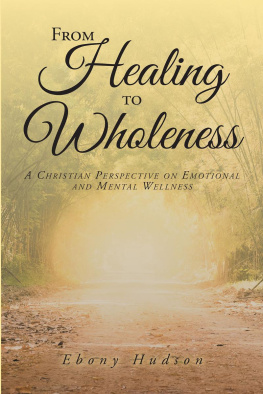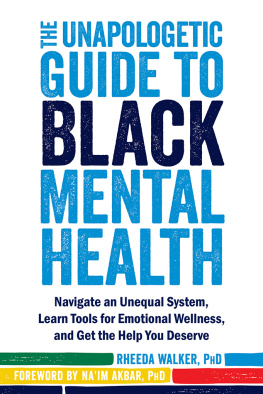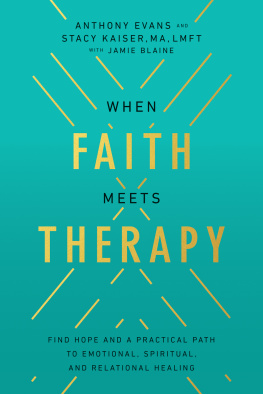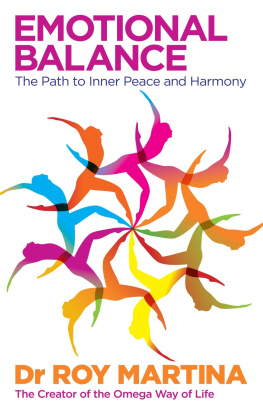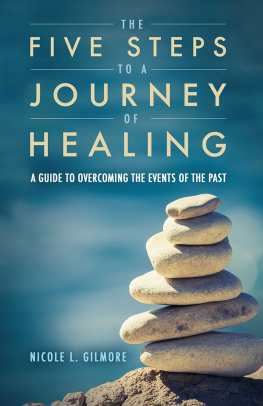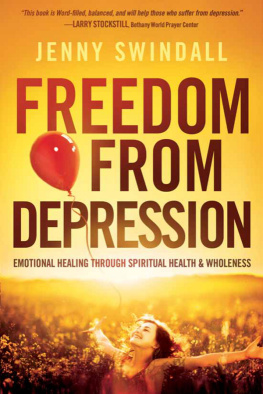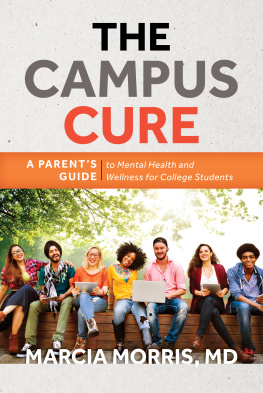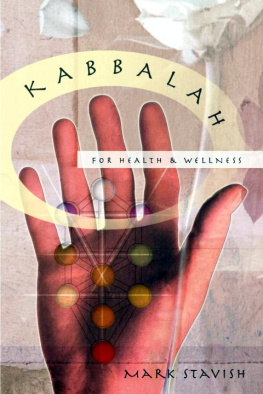Chapter 1
The Importance of Wellness
In Luke 17:1119, we read the story of the ten men who had leprosy and cried out to Jesus for healing. In the process of their obedience in following Jesuss instructions to go to the priests, they were healed. However, there was one leper who, after realizing that he was healed from the disease, returned to Jesus and gave Him praise and gratitude. In verse 19, Jesus is recorded as saying, Arise, go thy way: thy faith hath made thee whole. In reading that passage of scripture, I have always focused on the fact that ten were healed, and only one came back to thank Jesus. As I was studying the passage again recently, verse 19 stuck out to me. I thought to myself, the man was already healed, yet Jesus told him the second time that he was made whole. Is it possible to be healed and not whole? Is it possible to be well in one or two areas of our lives and yet not whole? Does it really matter if Im whole? Couldnt the one leper just be happy that he was healed? Why did he have to turn back? Do I need to turn back? What does wholeness look like?
A familiar scripture in the Bible is 3 John 1:2, which reads, Beloved, I wish above all things that thou mayest prosper and be in health, even as thy soul prosper. So I can be prosperous in business, finances, and career as well as be healthy (not just physically and mentally but emotionally as well) and have my soul right with God; that sounds like wholeness! In my work as a clinical social worker, I have been trained to look at the whole person, the systems that impact that person, and to help them achieve wellness, not only in the area that they are seeking help with, but also recognizing that there are other areas that they need to address in order to have well-rounded wellness or wholeness. As a Christian, I am called to not only read the Bible but also to live the Bible, and if it says I can be healed and made whole, I am striving to be both healed and made whole. Wholeness does refer to all areas of lifephysical, spiritual, financial, emotional, mental, and social. However, for purposes of this book, I am focusing on emotional and mental health; and although wholeness is important for every individual, regardless of religious beliefs, I am focusing on this topic from a Christian perspective.
One of the ways in which we attempt to determine how well we are doing is by determining if we are normal. We ask such questions as, Am I normal? Is my family normal? Are my relationships normal? Who is normal? What is normal? These are age-old questions that we all ask ourselves at some time or another. In a society where celebrities, social media, and political agendas determine the norm, it is a question whose answer is ever-changing. The better question is Does normal really exist? The fact is that what is normal for one person is not, and cannot be, normal for another, just as the areas that we need healing are based on our individual needs. What is normal for each of us changes, so our sense of normal is very fluid. Ecclesiastes 3:1 (KJV) says, To everything there is a season, and a time to every purpose under the heaven. As with nature, our lives go through different seasons, usually a lot faster than the four seasons.
Lets look at normal from the natural and spiritual perspectives. I believe that in order to maintain good mental health, we must stop asking and wondering if we are normal. That does not mean to suggest that some of the symptoms we experience, both physically and mentally, are not abnormal, therefore requiring professional attention, treatment, and/or preventative measures. One of the reasons it is not helpful to focus on the question of normality is because it is always changing, and if you try to keep up with all the changes as established by society, it can produce anxiety and feelings of insecurity and hopelessness, which are enemies of healing and wholeness.
Normal does, and should, include many societal norms. Obeying laws, observing personal space, using inside and outside voices appropriately, wearing clothes in public, and good hygiene are just a few examples of what we would consider a societal norm. What is a normal lifestyle for us becomes a problem when it has a negative effect on us physically, mentally, spiritually, financially, etc. It also becomes a problem for us when it negatively affects our family, community, or society at large. When we experience these negative consequences in our lives, we seek healing in that area and begin the journey to wholeness.
Have you ever watched a child try to shove an object of one shape into an object of another shape and become increasingly frustrated because it doesnt fit? In some ways, this is what we do when it comes to discussing normal. If we consider our lives before some event and/or passage of time as a circle shape and our current life as a triangle shape, many of us become like the child trying to force the circle into the triangle and become increasingly frustrated when it doesnt fit. For the child, frustration can be observed in the form of temper tantrums, throwing objects, and/or crying. For adults, the frustration can be observed as depression, anxiety, suicidal ideations, and other emotional problems. We must learn that when life changes our shape, we must come to terms with its new shape or take appropriate steps to changing into what we want our normal to look like, without obsessing about what it used to be since we cannot go back in time. You are allowed to grieve over your past normal, but please dont live in your past as that can have negative ramifications on your present and future.
Taking care of our physical bodies is so important to our mental health and well-being; it is important to our spiritual health as well. When I worked as a social worker on an inpatient mental health unit and we had someone admitted with such diagnoses as depression, suicidal thoughts, and psychosis, with no previous history, the first thing the doctor would do is a medical workup. They wanted to make sure that the presenting mental health symptoms were not due to some underlying medical issue. We know just from watching the commercials that many medications can have side effects that resemble minor and/or major mental health symptoms. How well do you take care of yourself physically? How much sleep do you get and is it a restful sleep? How balanced is your diet? Do you exercise? And does God really care about the answers to these questions? Yes!
In addition to 3 John 1:2, 1 Corinthians 6:1920 states, What? know ye not that your body is the temple of the Holy Ghost which is in you, which ye have of God, and ye are not your own? For ye are brought with a price: therefore glorify God in your body, and in your spirit, which are Gods. Take care of you . I know thats easier said than done since for many of us, it is easier and more natural to put others first. Many people even feel a sense of guilt for taking care of themselves as it seems selfish and arrogant, but it is of vital importance. My intention is not to tell you what to eat, how much to exercise, or what kind of mattress and pillow you should sleep on; but I would suggest speaking with your medical personnel on ways in which you can achieve and maintain a healthy lifestyle. If you are suddenly experiencing mental health symptoms and difficulties coping with life and everyday occurrences, I would recommend seeking professional help. Sometimes, it may be due to something as simple as medicines or medication interactions. At other times, your medical professional may recommend counseling, group therapy, and/or support groups. Treat your body as the temple God says it is.
I am a big proponent of relaxation techniques and taking even five to ten minutes a day to clear our minds of the busyness of the day. As a Christian, I believe the best relaxation techniques are those that bring our mind back to the Prince of Peace, one of His names (and character traits) as listed in Isaiah 9:67. John 14:27 says, Peace I leave with you, my peace I give unto you; not as the world giveth give I unto you. Let not your heart be troubled, neither let it be afraid. The following is a brief relaxation technique I use, and it can be adapted to better suit each individual. The purpose is more important than the process. Find a technique that works best for you.

